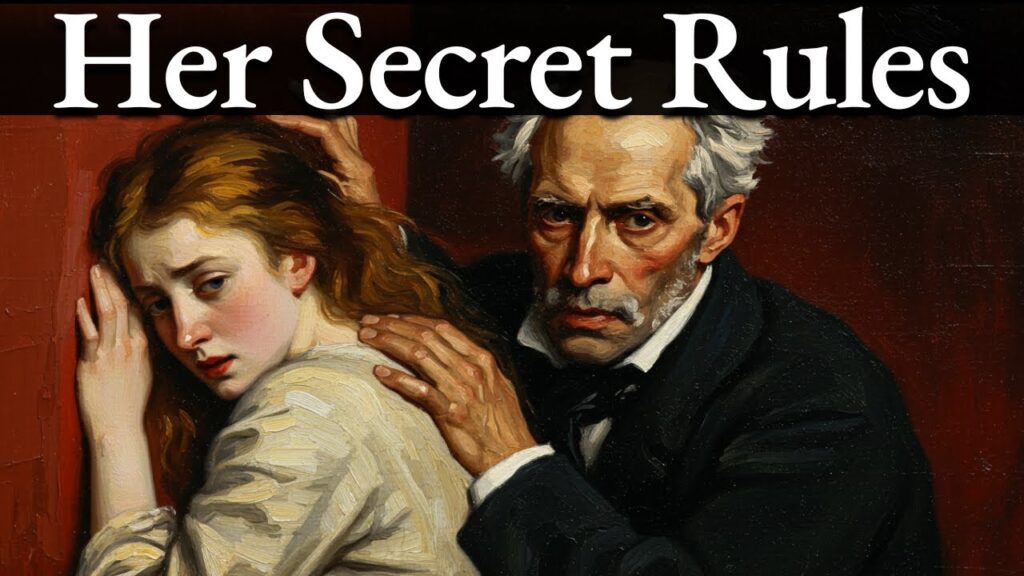Schopenhauer said, “A man’s love is a demand. A woman’s love is a surrender.”
But that surrender isn’t random — it follows ancient, hidden laws. Every heartbreak, every fading spark, every betrayal is biology playing out.
Today, you’ll uncover the brutal truth behind attraction and desire — the game you’ve been playing without knowing the rules.
Are you ready to see love as it really is?

Schopenhau warned us two centuries ago, “A man’s love is a demand. A woman’s love is a surrender.” What he didn’t tell you is that this surrender follows ancient unspoken laws. Laws that decide which man are worshiped and which are discarded. Every confusion you felt, every time a woman’s interest faded for no reason, every betrayal that seemed to come from nowhere, these aren’t accidents. They’re the inevitable result of biological imperatives so powerful even women obey them unconsciously. Within the next few minutes, you’ll see what the philosopher kings understood. The hidden hierarchy of male worth. This isn’t bitterness. It’s revelation. And once you see it, you’ll finally understand the game you’ve been playing your whole life without knowing the rules. Imagine this. A man, let’s call him Daniel, falls in love. Not just any love, a consuming, all-encompassing devotion. He meets a woman who seems perfect, intelligent, kind, magnetic. He gives her everything. His time, his money, his emotional vulnerability. For a while, it’s bliss. Then slowly, she pulls away. She becomes cold, distant. When he asks why, she says she just doesn’t feel the same anymore. Daniel is shattered. He replays every moment wondering what he did wrong. But here’s the brutal truth. He did nothing wrong. His only mistake was believing love was rational. Schopenhau saw through this illusion. He called romantic love the genius of the species. A trick played by nature to ensure reproduction. Women, he argued, are not driven by conscious choice, but by deep unconscious instincts shaped over millennia. Modern science confirms this. A 2013 study in the Archives of Sexual Behavior found that women’s attraction shifts based on ovulation cycles, subconsciously favoring dominant, genetically superior men when fertile, then seeking stable providers afterward. This isn’t cruelty, it’s biology, and men who don’t understand it are destined for pain. Consider the case of Lord Byron, the legendary poet whose charm seduced half of Europe. Women threw themselves at him, not because he was kind, but because he was dangerous. He embodied the dark triad traits, narcissism, mchavelianism, psychopathy that trigger primal attraction. Yet after conquest, he discarded them without remorse. The women, they still adored him. Why? Because their unconscious desires weren’t looking for fairness. They were looking for survival. The same instinct that makes a woman chase a rogue like Byron will make her lose interest in a nice guy who prioritizes her over his own mission. Here’s where it gets darker. A 2009 study in personal relationships revealed that women are more likely to cheat with men who exhibit high testosterone markers, broad shoulders, deep voices, even the scent of dominance. This isn’t about morality. It’s about wiring. Schopenhauer warned that women’s loyalty is conditional, tied to a man’s ability to maintain perceived superiority. The moment he slips into emotional dependency, her unconscious mind starts searching for an upgrade. But this isn’t hopeless. In fact, it’s liberating. Once you accept that female desire is amoral and instinctual, you stop taking rejection personally. You stop begging for love and start commanding it. The men who thrive, the Byron, the Casanovas, the untamed philosophers knew this truth instinctively. They didn’t hate women. They mastered them. But what happens when a woman’s unconscious desires clash with her conscious morals? Now, we’ll expose the dual mating strategy. how women secretly crave two types of men and how you can use this to your advantage. You’ll hear the shocking case of a Victorian widow who manipulated an entire bloodline and what it reveals about the female psyche. This is not a game for the faint of heart. Are you ready to play? Imagine a woman standing at a crossroads, torn between two men. The first is stable, reliable, the kind of man she can bring home to her parents. The second is unpredictable, magnetic, the kind of man who ignites her deepest, most forbidden fantasies. She tells herself she wants the first, but her body, her dreams, her unconscious impulses betray her. This isn’t a flaw in her character. It’s an evolutionary script written over thousands of years. Schopenhau called it the cruel irony of female nature. Women need security, but they ache for danger. Modern researchers call it the dual mating strategy. And once you understand it, you’ll never see relationships the same way again. Let’s strip away the illusions. In 2012, a landmark study published in Evolution and Human Behavior found that women in committed relationships reported higher sexual desire for dominant high testosterone men during ovulation, even if they were happily married. This wasn’t about conscious choice. It was an unconscious pull hardwired into their biology. The implications are staggering. A woman can love you, build a life with you, even swear loyalty to you. But if you fail to embody the primal traits that trigger her deepest attraction, her mind will wander. Not because she’s wicked, because she’s human. History is littered with examples. Take Katherine the Great, one of the most powerful women in history. She married Peter III, a weak and ineffective ruler. What did she do? She overthrew him, had him assassinated, and took a string of young viral men, men who exuded raw masculinity. Was she evil? No. She was following an instinct older than civilization itself. Schopenhau saw this pattern everywhere. Women despise weakness, even in men they love. The moment a man becomes too safe, too predictable, too emotionally available, her unconscious mind begins to rebel. But here’s where most men get it wrong. They think the solution is to become the dangerous lover, the untamed rogue. That’s a fatal error. The real secret is balance. What evolutionary psychologists call socially dominant monogamy. You must be both. the rock she leans on and the storm that thrills her. A 2017 study in personality and social psychology bulletin revealed that women are most satisfied in relationships where their partner is kind in public but dominant in private. They want a man who is respected by others, even feared, but who reserves his softness for her alone. This is the razor’s edge that separates the betrayed from the irreplaceable. Consider the case of Lord Randph Churchill, father of Winston Churchill. He was a rising political star, a man of status and intellect. But he made one fatal mistake. He became predictable. His wife Jenny adored him until she didn’t. She took multiple lovers, including a young officer who was everything Randolph wasn’t. Reckless, passionate, dangerous. When Randolph confronted her, she didn’t deny it. She simply said, “I couldn’t help myself.” Schopenhau would have nodded in grim understanding. Women don’t cheat because they plan to. They cheat because they can’t resist what they’re wired to desire. So, what’s the solution? Do you become a tyrant, a manipulator? No. The answer is self-mastery. You must cultivate a life so compelling, a presence so unshakable that her dual instincts, security and excitement, are satisfied by you alone. This isn’t about controlling her. It’s about commanding respect so deep it borders on awe. The men who achieve this don’t fear betrayal because they know they are the storm and the shelter. But there’s a darker layer to this. What happens when a woman’s unconscious desires aren’t just about attraction, but about destroying men who fail the test? Now, we’ll expose the female vengeance instinct. How women punish weakness in ways that leave men broken, sometimes without even realizing they’re doing it. You’ll hear the true story of a famous artist who loved a woman too much, and how she dismantled him piece by piece. If you’ve made it this far, you’re not faint-hearted. You’re waking up. There is a special kind of cruelty reserved only for men who failed the test of masculinity. Not the cartoonish macheismo of chestthumping fools, but the quiet, unshakable strength that makes a woman feel both protected and enthralled. When a man loses this, something terrifying awakens in the female psyche. Schopenhauer saw it clearly. Women despise weakness more than they despise wickedness. A tyrant can be admired. A coward is only ever pied and then destroyed. History whispers this truth in the stories of broken men. Take Oscar Wild, the brilliant wit who brought London to its knees with his words. He had it all. fame, genius, the adoration of high society. Then he met Lord Alfred Douglas, a beautiful but poisonous young aristocrat. Wild fell desperately in love, and in that moment of vulnerability, he sealed his fate. Douglas’s father, the Marcus of Queensberry, accused Wild of sodomy. Instead of walking away, Wild sued for liel, a fatal error. The trial exposed his private life, and he was sentenced to 2 years of hard labor. But here’s the chilling part. It was Wild’s own lover, Lord Alfred, who turned on him first. When Wild was at his lowest, Douglas abandoned him without a second thought. Why? Because Wild had ceased to be the untouchable wit who commanded rooms. He had become a desperate, lovesick fool. And nothing is more repulsive to the unconscious female mind than a man who begs for love. This isn’t just about wild. It’s about every man who has ever been discarded the moment he showed his wounds. A 2015 study in social, psychological, and personality science found that women perceive emotional vulnerability in men as a loss of status, even if they consciously claim to value openness. The researchers called it the paradox of male vulnerability. Women say they want a man who shares his feelings, but their primal instincts recoil at the sight of weakness. Schopenhau put it bluntly. A man’s love is a demand. A woman’s love is a surrender. The moment a man stops demanding respect and starts pleading for affection, he triggers a woman’s deepest contempt. Consider the case of Friedri Nichze, the philosopher who wrote, “When you gaze long into an abyss, the abyss also gazes into you.” He learned this truth the hard way. In 1882, Nze met Lou Andreas Salomi, a brilliant and ruthlessly independent young woman. He fell for her instantly, proposing marriage through a mutual friend. Salame rejected him. But what happened next was worse. She and Nichi’s closest friend, Paul Ree, began a close, almost intimate friendship, excluding Nichi entirely. The rejection was one thing. The humiliation was another. Nichi, the man who would later declare, “God is dead,” was broken by a woman’s indifference. He spent the rest of his life in isolation, writing passages like, “You go to women, do not forget the whip.” It wasn’t misogyny. It was the furious realization that even the greatest minds are not immune to the female vengeance instinct. But why does this instinct exist? Evolutionary psychology offers a grim answer. For most of human history, a weak man was a death sentence, unable to protect, provide, or pass on strong genes. Women who tolerated weakness risked extinction. So nature hardwired them to punish it mercilessly. This isn’t conscious, it’s automatic. A woman doesn’t decide to lose attraction when a man cries in front of her. Her body decides for her. A 2008 study in evolutionary psychology found that women rated images of men crying as significantly less sexually attractive than images of men displaying anger or stoicism. The message is clear. Suffer in silence or suffer alone. So, what’s the solution? Should men never show emotion, never reveal their pain? No. The answer is far more nuanced. The difference between a man who is respected and a man who is pied lies in how he expresses vulnerability. A king who shares his burdens is still a king. A beggar who whines about his wounds is just a beggar. The men who navigate this successfully, the ones who earn loyalty rather than scorn, understand that vulnerability must be a display of strength, not a plea for sympathy. But there’s one final layer to this descent into the female psyche. What happens when a woman’s vengeance isn’t just emotional, but financial, legal, and social? This is where we expose the most dangerous aspect of the female unconscious, the weaponization of victimhood. You’ll hear the true story of a famous musician who trusted the wrong woman and lost everything. This is where the game turns deadly. And if you think you’re immune, you’re already losing. History’s darkest truth is this. The most effective assassins never wield daggers. They wield tears. They wield whispers. They wield the unshakable presumption of innocence that cloaks their every move. Long before hashtags and courtroom spectacles, women perfected the art of social execution. And the men who underestimated this power found their lives dismantled piece by piece. Schopenhau saw the pattern clearly. A woman’s vengeance is never hot-blooded. It is slow, calculated, and dressed in the garments of virtue. Consider the fate of Socrates, the father of Western philosophy. His crime, corrupting the youth of Athens, but the true architect of his downfall was not the state. It was the wives. Ancient texts reveal how Athenian mothers, furious that Socrates taught their sons to question tradition, fueled the accusations against him. They didn’t need evidence. They needed only to plant the seed of doubt in the minds of husbands and fathers. When the hemlock touched his lips, it wasn’t just democracy killing Socrates. It was the collective vengeance of women who feared losing control over their sons. The Middle Ages offer an even starker example. The Malus Maleficarum witch trials. While history remembers the burning of female witches, few note how many men were destroyed by female testimony. In 1437, the knight Johan von Hagen was accused of sorcery after rejecting the advances of a nobleman’s daughter. She claimed he’d enchanted her into lust, a charge that carried the penalty of slow suffocation under hot stones. No proof was required. The mere accusation from a woman of status was enough. This wasn’t justice. It was sexual rejection weaponized as supernatural crime. Even kings weren’t immune. King Louis V 16th of France didn’t just lose his head to the guillotine. He lost his reputation first. The revolutionary pamphlets circulating Paris didn’t attack his policies. They attacked his manhood. spread by salon like Madame Roland who whispered of his impotence and Marie Antuinette’s infidelities. These rumors didn’t originate with male political rivals. They were the work of educated women and intellectual circles who understood that to destroy a leader, you must first make him ridiculous. Schopenhau noted this tactic. Women know that a man laughed at is already dead. The Victorian era refined this into science. In 1857, the Matrimonial Causes Act allowed British women to divorce abusive husbands, a noble premise that soon became a weapon. The diaries of barristers reveal cases like that of Admiral Henry Codrington, whose wife fabricated abuse claims to seize his estate. When investigators found no bruises, she simply claimed his psychological torture left no marks. The court believed her. Why? Because the 19th century had already established the template, female testimony required no corroboration when alleging male cruelty. What connects these cases across millennia? The three unchanging rules. One, the premium on perception. Most women’s accusations don’t need to be true. It only needs to be plausible enough to plant doubt. The 16th century Venetian cortisan Veronica Franco demonstrated this when she destroyed a rival by claiming he’d stolen her honor. Knowing the accusation itself would ruin him regardless of trial outcomes. Two, the exploitation of chivalry. Male honor compels men to defend the weak. Joon of Ararc didn’t lead armies because she was a warrior. She led because French knights couldn’t bear the thought of a peasant girl shaming them into action. Three, the slowblade. Female vengeance rarely comes in heat. It comes in the cooled moment when witnesses are prepped, alibis fabricated, and societal pressure mounted. Anne Bolin didn’t fall because Henry VIII was tired of her. She fell because court women like Jane Seymour meticulously documented every treasonous remark. The solution isn’t hatred of women. It’s understanding their power. The men who survived these games shared one trait. They never allowed themselves to be isolated. The Medici lords kept networks of spies in convents where noble women gossiped. Benjamin Franklin published letters from female admirers to preempt false accusations. These weren’t paranoid men. They were students of history. As we close this exploration, remember Schopenhau’s bleakest insight. In the war between the sexes, the first casualty is always truth. You now hold the weapons of awareness. Not to wage war, but to never again be its unwitting casualty. The game hasn’t changed in 5,000 years. Only now you see the board.


